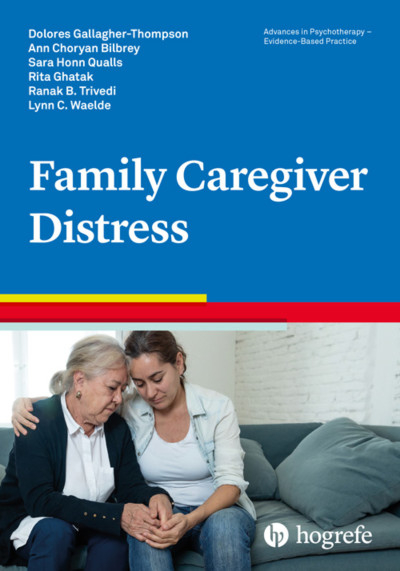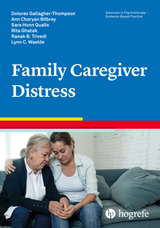Family Caregiver Distress
Hogrefe Publishing (Verlag)
978-0-88937-517-8 (ISBN)
Examines the issues caregivers face
Details the best tools for assessment
Explores evidence-based approaches
Includes clinical vignettes
Reflects on diversity, equity, and inclusion
Includes downloadable handouts
Guidance for supporting family caregivers on maintaining positive mental health:
This is the first book that takes a "deep dive" to answer the questions that mental health providers encounter when working with family caregivers. Just what are the unique issues family caregivers face? How does this impact their mental health? What can providers do to help?
Based on research and clinical experiences of the authors, this volume in our Advances in Psychotherapy series focuses on examining the specific issues that caregivers of people with Alzheimer's disease or other forms of dementia face. Practitioners learn about the best tools for assessment and which evidence-based interventions help reduce caregiver distress - including cognitive behavioral therapy, acceptance and commitment therapy, and multicomponent intervention programs.
Resources in the appendix include a caregiver intake interview, and the book is interspersed with clinical vignettes that highlight issues of diversity, equity, and inclusion - making this is an essential text for mental health providers from a variety of disciplines (including psychology, psychiatry, nursing, social work, marriage and family counselors as well as trainees).
Dolores Gallagher-Thompson, PhD, ABPP, is active Professor Emerita in the Department of Psychiatry/Behavioral Sciences at Stanford University, School of Medicine. Ann Choryan Bilbrey, PhD, is the CEO of the Optimal Aging Center for Training and Research Consultation. Sara Honn Qualls, PhD, ABPP, is Kraemer Family Professor of Aging Studies and Professor of Psychology at the University of Colorado Colorado Springs. Rita Ghatak, PhD, is active in direct care, research, and education and founder of Aging Adult Services at Stanford University Medical Center, and CEO of Aging101. Ranak B. Trivedi, PhD, is assistant professor at Stanford University and a director of education and training in the VA Palo Alto Health Care System. Lynn C. Waelde, PhD, is a professor emeritus at Palo Alto University and developer of the program Inner Resources for Stress.
Acknowledgments
Preface
1 Description
1.1 Terminology
1.1.1 Individuals Providing and Receiving Care
1.2 Caregiver Demographics
1.2.1 Ethnic and Racial Diversity of Caregivers
1.2.2 Age, Relationship to Care Recipient, and
Gender
1.2.3 Reasons for Providing Care
1.3 The Emotional and Physical Impacts of
Caregiving
1.3.1 Common Caregiver Responses to Stress:
Mental Health Issues
1.3.2 Common Caregiver Responses to Stress:
Physical Health Issues
1.3.3 Other Stressors Most Caregivers Face
1.3.4 Positive Aspects of Caregiving .
1.4 Knowledge of the Care Recipient's Dementia
1.4.1 Neurocognitive Disorders: Basics About
Dementia
2 Theories and Models
2.1 Stress and Coping Model
2.2 Sociocultural Model
2.3 Trajectory of Illness Model
2.4 Transition Into Early-Stage Caregiving
2.4.1 Description
2.4.2 Interventions .
2.5 Early-Stage Caregiving
2.5.1 Description
2.5.2 Intervention
2.6 Transition Into Middle Stage
2.6.1 Description
2.6.2 Interventions
2.7 Transition Into Late Stage
2.7.1 Description
2.7.2 Interventions
2.8 Postcaregiving Life
2.8.1 Description
2.8.2 Interventions
2.9 Interventions With Family Systems
2.9.1 Rationale for the Family Systems Approach
2.9.2 Theories of Family Therapy and Applications
to Caregiving
2.10 Dyadic Models
3 Assessment
3.1 Caregiver Core Assessment Battery
3.1.1 Overall Mental Health
3.1.2 Caregiver Specific Challenges
3.1.3 Caregiver Supports
3.2 Optional Measures to Address Unique Needs
3.2.1 Suicidal Assessment
3.2.2 Screening for Cognitive Function
3.2.3 Other Specific Measures
3.2.4 Assessing Domains Not Listed
3.2.5 Working With Diverse Caregivers
3.2.6 Monitoring Change
3.3 Assessment Tools in Depth
3.3.1 Overall Mental Health
3.3.2 Caregiving Challenges
3.3.3 Caregiving Supports
3.3.4 Optional Measures
4 Interventions to Reduce Caregiver Distress
4.1.1 Levels of Intervention
4.1.2 Supporting Evidence for Interventions
4.1.3 Diversity and Inclusion Issues
4.2 Psychoeducational Interventions
4.2.1 Coping With Caregiving (CWC)
4.2.2 Savvy Caregiver Program
4.2.3 Inner Resources for Stress (IR)
4.2.4 Building Better Caregivers (BBC)
4.2.5 iSupport
4.3 Specialized Care: Psychotherapeutic
Interventions
4.3.1 Cognitive Behavioral Therapy (CBT)
4.3.2 Acceptance and Commitment Therapy (ACT)
4.4 Multicomponent Intervention Programs
4.4.1 Resources for Enhancing Alzheimer
Caregivers Health (REACH II)
4.4.2 New York University Caregiver Intervention
(NYUCI) Program
4.5 Family Systems Approach
4.5.1 Family Interventions
4.5.2 Dyadic Therapy
4.6 Technology-Enabled Interventions
4.6.1 Caregiver Wellness and Self-Care
4.6.2 Caregiver Education and Navigation
4.6.3 Caregiver Support
4.6.4 Caregiving Task Management
4.6.5 Adaptive Home Products
4.6.6 Using Technology in Session
4.7 Other Interventions
4.7.1 Care Management
4.7.2 Palliative Care
4.8 Ethical Dilemmas Often Experienced by
Caregivers
4.8.1 Over-Arching Themes
4.8.2 Practical Issues Rooted in Ethical Dilemmas
in the Caregiving Trajectory
4.9 Summary of Critical Points to Effectively Treat
Distressed Caregivers
5 Professional Practice Issues
5.1 Training Content and Competencies
5.2 Education and Training Resources
5.3 Billing for Caregiver Services
6 Case Vignette
7 Further Reading
8 References
9 Appendix: Tools and Resources
| Erscheinungsdatum | 26.09.2023 |
|---|---|
| Reihe/Serie | Advances in Psychotherapy - Evidence-Based Practice ; vol. 50 |
| Verlagsort | Toronto |
| Sprache | englisch |
| Maße | 177 x 254 mm |
| Themenwelt | Geisteswissenschaften ► Psychologie ► Klinische Psychologie |
| Sozialwissenschaften ► Pädagogik ► Sozialpädagogik | |
| Sozialwissenschaften ► Soziologie | |
| ISBN-10 | 0-88937-517-8 / 0889375178 |
| ISBN-13 | 978-0-88937-517-8 / 9780889375178 |
| Zustand | Neuware |
| Informationen gemäß Produktsicherheitsverordnung (GPSR) | |
| Haben Sie eine Frage zum Produkt? |
aus dem Bereich




